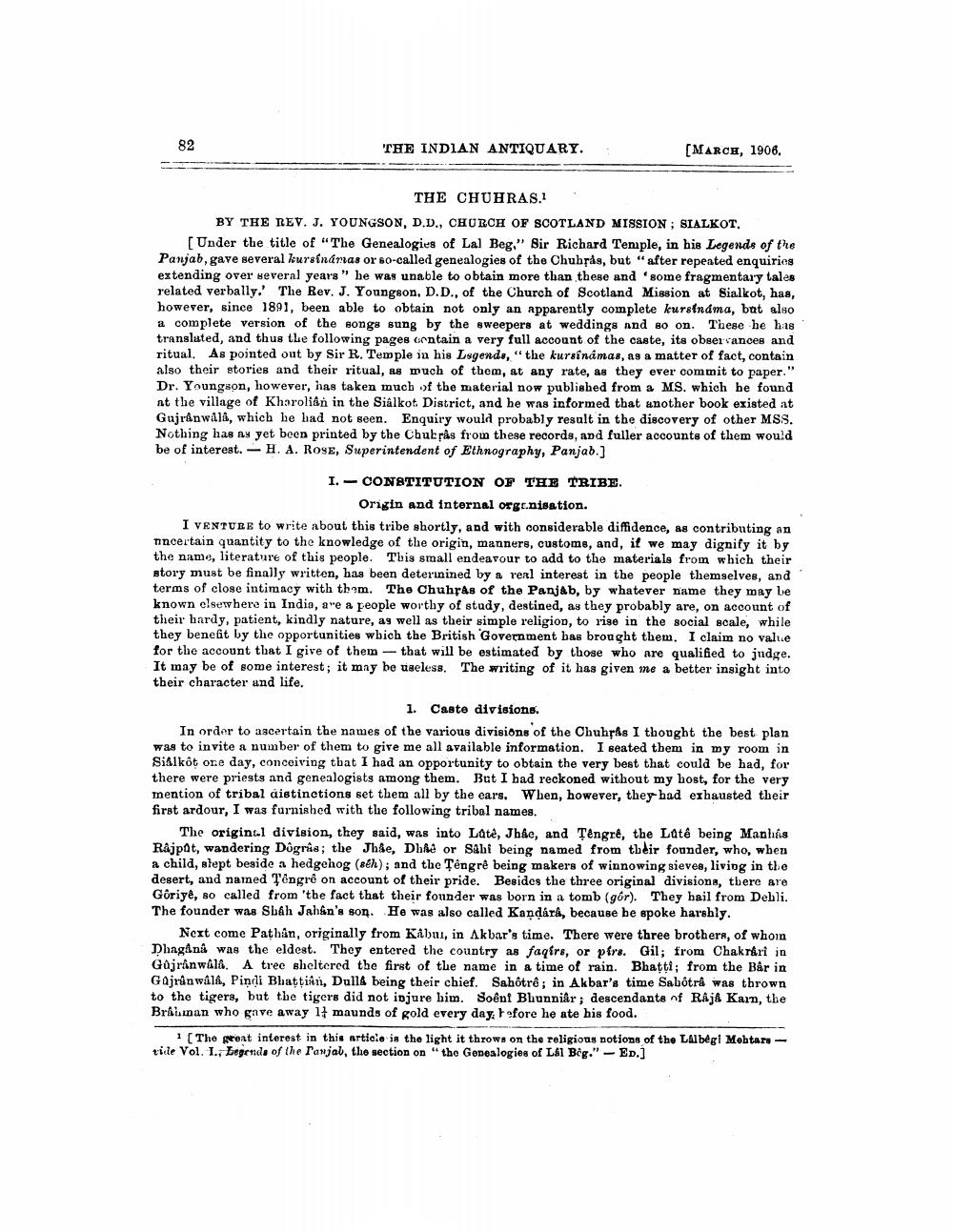________________
THE INDIAN ANTIQUARY.
[MARCH, 1906.
THE CHUHRAS. BY THE REV. J. YOUNGSON, D.D., CHURCH OF SCOTLAND MISSION : SIALKOT, [Under the title of "The Genealogies of Lal Beg," Sir Richard Temple, in his Legends of the Panjab, gave several leursfnanas or so-called genealogies of the Chubrds, but "after repeated enquiries extending over several years" he was unable to obtain more than these and some fragmentary tales related verbally.' The Rev. J. Youngeon, D.D., of the Church of Scotland Mission at Sialkot, has, however, since 1891, been able to obtain not only an apparently complete kursfndma, bat also a complete version of the songs sung by the sweepers at weddings and so on. These he has translated, and thus the following pages contain a very full account of the caste, its observances and ritual. As pointed out by Sir R. Temple in his Lsgends, "the kursinamas, as a matter of fact, contain also their stories and their ritual, as much of them, at any rate, as they ever commit to paper." Dr. Youngson, however, has taken much of the material now published from a MS, which he found at the village of Kharolian in the Sialkot District, and he was informed that another book existed at Gujranwala, which he had not seen. Enquiry would probably result in the discovery of other MSS. Nothing has as yet been printed by the Chutsås from these records, and fuller accounts of them would be of interest.-H. A. Rose, Superintendent of Ethnography, Panjab.)
I.- CONSTITUTION OF THE TRIBE.
Origin and internal organisation. I VENTURR to write about this tribe shortly, and with considerable diffidence, as contributing an mincertain quantity to the knowledge of the origin, manners, custome, and, if we may dignify it by the name, literature of this people. This small endeavour to add to the materials from which their story must be finally written, has been deterinined by a real interest in the people themselves, and terms of close intimacy with them. The Chuhras of the Panjab, by whatever name they may be known elsewhere in India, are a people worthy of study, destined, as they probably are, on account of their hardy, patient, kindly nature, as well as their simple religion, to rise in the social scale, while they benefit by the opportunities wbich the British Government bas brought them. I claim no value for the account that I give of them -- that will be estimated by those who are qualified to jndge. It may be of some interest; it may be useless. The writing of it has given me a better insight into their character and life.
1. Caste divisions. In order to ascertain the names of the various divisions of the Chuhfas I thought the best plan was to invite a number of them to give me all available information. I seated them in my room in Sialkot one day, conceiving that I had an opportunity to obtain the very best that could be had, for there were priests and genealogists among them. But I had reckoned without my host, for the very mention of tribal distinctions set them all by the ears. When, however, they had exhausted their first ardour, I was furnished with the following tribal names.
The original division, they said, was into Latê, Jhke, and Têngre, the Laté being Manhiis Rajpat, wandering Dögris; the Jhe, Dhad or Sabi being named from their founder, who, when a child, slept beside a hedgehog (seh); and the Têngre being makers of winnowing sieves, living in the desert, and named Tôngre on account of their pride. Besides the three original divisions, there are Goriye, so called from the fact that their founder was born in a tomb (gór). They hail from Debli. The founder was Sbkh Jahan's son. He was also called Kandára, because he spoke harshly.
Next come Pathan, originally from Kibui, in Akbar's time. There were three brothers, of whom Dhagana was the eldest. They entered the country as faqirs, or pfre. Gil; trom Chakrari in Gujranwala. A tree sheltered the first of the name in a time of rain. Bhatti; from the Bar in Gajranwala, Pindi Bhattian, Dulla being their chief. Sahôtrê; in Akbar's time Sabótra was thrown to the tigers, but the tigers did not injure bim. Soên Bhunniar; descendants nf RAJA Kain, the Braluman who gave away 17 maunds of gold every day, efore he ate his food.
[The great interest in this article is the light it throws on the religious notions of the Lalbegi Mohtars - title Vol. 1., Legends of the ranjal, the section on the Genealogies of Lái Bèg." - ED.]




